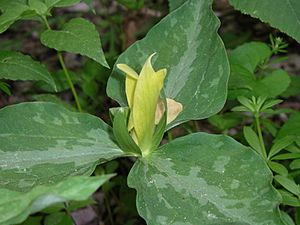Yellow trillium facts for kids
Trillium luteum, also known as the yellow trillium or yellow wakerobin, is a beautiful flowering plant. It belongs to the bunchflower family, called Melanthiaceae. This plant naturally grows in the Great Smoky Mountains in the United States and the areas around them.
Quick facts for kids Yellow trillium |
|
|---|---|
 |
|
| Conservation status | |
| Scientific classification |
|
| Kingdom: | Plantae |
| Clade: | Tracheophytes |
| Clade: | Angiosperms |
| Clade: | Monocots |
| Order: | Liliales |
| Family: | Melanthiaceae |
| Genus: | Trillium |
| Species: |
T. luteum
|
| Binomial name | |
| Trillium luteum Harb., 1901
|
|
| Script error: The function "autoWithCaption" does not exist. | |
Script error: No such module "Check for conflicting parameters".
Contents
What Does Yellow Trillium Look Like?
This plant can grow up to 40 centimeters (about 16 inches) tall and 30 centimeters (about 12 inches) wide. It's a type of perennial plant, which means it lives for more than two years. It grows in woodlands and has soft stems, not woody ones.
Its Unique Flowers and Leaves
The yellow trillium blooms in spring with bright lemon-yellow flowers. These flowers even have a nice scent! Its large leaves are special because they don't have stalks. They come in groups of three and often have cool grey-green patterns, like marble, on their surface.
When Does It Grow?
You'll see it flowering in April and May. It grows under the branches of deciduous trees, which are trees that lose their leaves in the fall. After it flowers and makes seeds, the plant goes to sleep for the summer. It then pops up again in late winter, ready for another spring.
How Yellow Trillium Got Its Name
The yellow trillium was first described a long time ago, in 1813. Back then, it was called T. sessile var. luteum. Later, a botanist named Harbison decided it was unique enough to be its own species, so he gave it the name Trillium luteum.
Because of this history, you might sometimes see Trillium luteum sold under its older name, which can be a bit confusing!
Where Does Yellow Trillium Grow?
It can be tricky to figure out exactly where pure yellow trillium plants grow. This is because they have often mixed with another plant called T. cuneatum in their natural homes. This mixing creates many plants that are a bit of both.
Main Home of Yellow Trillium
The biggest group of yellow trillium plants lives in Eastern Tennessee. They also spread into North Carolina and Georgia. You can find many of them around a town called Gatlinburg in Tennessee.
Other Places It's Found
This plant also grows in Kentucky. You might find it in a few scattered spots farther north, like in Ontario, Michigan, Pennsylvania, Maryland, and northern Virginia. However, these northern plants might have been brought there by people and started growing on their own, rather than being naturally from those areas.
Growing Yellow Trillium in Your Garden
If you want to grow yellow trillium, it needs a special spot. Even though it can handle cold weather down to about -15 degrees Celsius (5 degrees Fahrenheit), it likes a protected place.
Ideal Growing Conditions
It needs rich, moist soil that's full of decaying leaves. This type of soil is called leafmould. It also needs a shady spot, like under deciduous trees in a woodland garden. This setup copies its natural home in the forests of North America.
Tips for Success
Once you plant it, it's best to leave it alone. If you don't disturb it, it can grow into a large group of plants. Growing yellow trillium successfully can take a little experience. However, it's a very rewarding plant and has even won an award called the Royal Horticultural Society's Award of Garden Merit for its beauty and garden worthiness.
 | James B. Knighten |
 | Azellia White |
 | Willa Brown |


